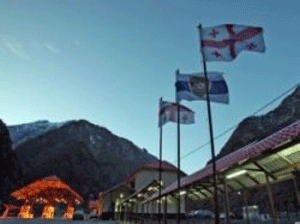Salome Achba
According to the resolution of the president of Georgia, which was put in motion on October 13, citizens of several republics within the Russian Federation –Chechnya, Ingushetia, North Ossetia, Kabardo-Balkaria and Adigei can enter Georgian territory without visa and stay here during 90 days. Larsi border checkpoint has already received first visitors from the North Caucasus. National TV-Channels have already spread the comments of the people who are pleased with the innovation. One of them was a famous sportsman, former football player of the Tbilisi “Dinamo” Bakhva Tedeev who said that he has many friends in Georgia and similar decision will support him to visit them oftener.
The Kremlin got irritated by the president’s resolution. Part of Georgian society also thinks that Georgia might face additional problems because of this decision.
Idea of the United Caucasus is not a new one. Georgian society has renewed discussion about his topic recently. The government of Georgia started to gain the favor of several republics in the North Caucasus in spring when the “Caucasus Friendship Group of the Parliament of Georgia” started intensive working on the genocide facts of Cherkez people in the 19th century. If the genocide facts are proved, the parliament of Georgia will be the first to acknowledge the genocide of Cherkez people.
Short time ago, president Saakashvili spoke about “independent, stable and unified” Caucasus at the UN General Assembly. Spokesperson of the president Manana Manjgaladze stated that president’s resolution on simplification of the visa regime was next step towards the idea which he had announced at the UN Assembly.
The foreign ministry of Georgia explains the decision by the liberalization of the visa regime. “The citizens of the republics of the North Caucasus republics faced some problems when crossing the border because they had to travel to Moscow to get Georgian visa. One more reason for similar decision was our wish to restore our traditional relations with our neighboring nations. Besides that, the citizens of those republics want to get high education in Georgian universities,” said deputy foreign minister of Georgia Nino Kalandadze.
Foreign ministry of Russia evaluated this resolution as next political provocation which aims to separate the North Caucasus from Russia. “This decision is a next propagandist step of Tbilisi. Civilized partners usually make similar decisions after two-sided negotiations,” stated the foreign minister of Russia Sergei Lavrov.
Georgian society also had controversial reaction about the president’s resolution. The number one problem is identification of the people who enter the country – how can a frontier police officer estimate whether the visitor is from the North Caucasus or let’s say from Vladivostok? The so-called international passports do not provide information about place of residence. In reply to this position, the MIA of Georgia clarified that they will identify the place of their residence by any document on which will prove their residence in the North Caucasus.
One more problem is connected with the security of the country. North Caucasus is famous for its high number of extremist organizations. Expert Mamuka Areshidze stated in his interview with the Radio “Liberty” that Russia might take advantage of the liberalized visa regime and send extremist organizations to Georgia on purpose.
“”First of all, it is organization “Dariali” which is located in the North Ossetia and whose members are ethnic Ossetian people displaced from Truso and Kobi Gorges in Georgia. Local authority and even Moscow support this organization; their aim is to seize territories in Kazbegi (Stepantsminda), Georgia to unify it with the North Ossetia. They tried several times to enter Georgia in an organized form but Russian side did not allow them to enter once or twice and in one occasion Georgian frontiers blocked them too. Now, if they do not cross the border in an organized form and enter our country one-by-one, it will be very difficult for our law enforcement officers and frontiers to identify who is the member of the “Dariali” and who is not.”
Spokesperson of the president of Georgia Manana Manjgaladze stated that security of Georgia is controlled by other methods and it has no connection with visa regime.
“Generally this idea is not bad because neighboring countries should not have visa regime with each other. If this decision aims at further integration of the North Caucasus people and establishment of good neighborly relations with us, I welcome it. However, since everybody is aware of the anti-Russian propaganda of the government of Georgia, this decision seems part of this propaganda to me. I think, this decision will result into escalation of the conflict and worsening of the Georgian-Russian relations,” said conflict scientist Paata Zakareishvili.
Russian experts also commented on the issue. According to the news agency Interpresnews, military expert Pavel Felgenhauer thinks that the president’s resolution might encourage Russian side to blame official Tbilisi in the support of “Boeviks”.
All in all, we will see in several months how the president’s resolution will work when several thousands of people will have already crossed the Larsi border checkpoint.
News
December 13, 2023
Ethnic minorities outside the peace dialogue
November 6, 2023
‘Peace’ agenda of political parties
Popular
Articles
February 13, 2024




